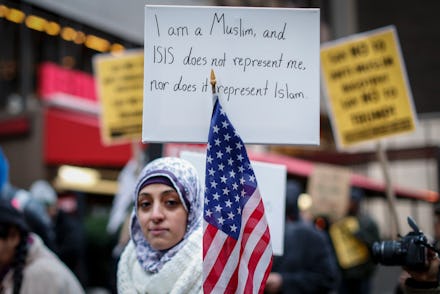Americans believe Muslims face the most discrimination in the US, new survey says

Within the past three years, there has been a major numerical shift in how American society perceives Muslims.
A Pew Research Center survey, released on Thursday, finds that 82% of Americans believe Muslims face discrimination in the United States. A majority (57%) believe they face "a lot" of unjust or prejudicial treatment, which is a 12% increase from 2013.
The survey revealed that Americans believe Muslims face discrimination the most, with blacks (76%), gays and lesbians (76%), Hispanics (70%) and women (60%) following behind. The survey also says a lot fewer Americans think Jews (44%) and evangelical Christians (42%) face a lot or some discrimination. About 39% of Americans say whites face some form of discrimination in the U.S.
The new findings also said that about 49% of Americans believe that Islam is no more likely than other faiths to promote violence. The percentage varies from different education levels. Americans with postgraduate (64%) or college degrees (57%) believe that Islam is not more violent than other religions, while 43% of high school graduates and 49% Americans with "some college" education believe that to be the case.
The survey, based on answers from 1,502 adults, was conducted from Nov. 30 to Dec. 5, several weeks after Donald Trump's presidential win, the Washington Post reported. The high percentage of Americans believing Muslims face "a lot" of discrimination shouldn't come as a surprise. Several civil rights groups and leaders have come forward condemning the use of Islamophobic rhetoric and anti-Muslim policies throughout much of the 2016 presidential election.
For example, in September 2015, then-presidential candidate Ben Carson told Chuck Todd while on NBC's Meet The Press that he believes Muslims should be "disqualified" from becoming president. In the wake of the March attack in Brussels, Belgium, Sen. Ted Cruz told CNN's Anderson Cooper that law enforcement agencies should deliberately patrol and police Muslim neighborhoods.
The anti-Muslim rhetoric intensified throughout the general election. In April, at a campaign rally in California, Trump galvanized his supporters with a violent false story of an American general shooting Muslims with bullets soaked in pig's blood. He has also proposed a Muslim registry database, reportedly under the leadership of Kansas State Secretary Kris Kobach, and a supporter of his campaign used the internment of Japanese-Americans as a precedent for it.
Throughout the presidential campaign, Mic has documented numerous anti-Muslim hate crimes in New York City, Queens, New York, Garden City, Kansas, Minneapolis and Boynton Beach, Florida, among many others.
According to some researchers, there is a correlation between Trump's blatant Islamophobia and the uptick of anti-Muslim hate crimes in the country. When Trump announced his proposal for a "complete and total shutdown" of Muslims entering the United States in December 2015, Georgetown University researchers documented 53 reported anti-Muslims attacks that month alone. These attacks often occurred multiple times a day on a near-daily basis. Senior researcher Nazir Harb told Mic in November that attacks that month comprised nearly one-third of all anti-Muslim attacks in 2015. On Nov. 15, the FBI's annual report on hate crimes found that there was a 67% uptick in anti-Muslim hate crimes in 2015 — making it the highest rate of anti-Muslim violence since the aftermaths of the 9/11 attacks.